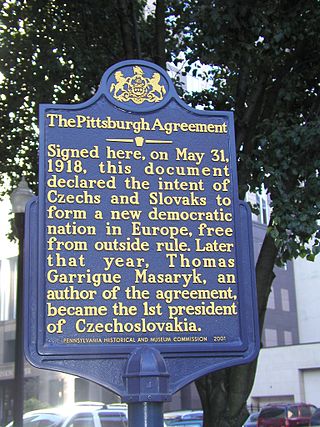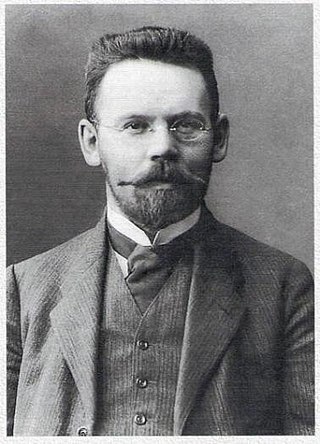
Czechoslovakia was a landlocked country in Central Europe, created in 1918, when it declared its independence from Austria-Hungary. In 1938, after the Munich Agreement, the Sudetenland became part of Nazi Germany, while the country lost further territories to Hungary and Poland. Between 1939 and 1945, the state ceased to exist, as Slovakia proclaimed its independence and Carpathian Ruthenia became part of Hungary, while the German Protectorate of Bohemia and Moravia was proclaimed in the remainder of the Czech Lands. In 1939, after the outbreak of World War II, former Czechoslovak President Edvard Beneš formed a government-in-exile and sought recognition from the Allies.

Tomáš Garrigue Masaryk was a Czechoslovak statesman, progressive political activist and philosopher who served as the first president of Czechoslovakia from 1918 to 1935. He is regarded as the founding father of Czechoslovakia.
The First Czechoslovak Republic emerged from the collapse of the Austro-Hungarian Empire in October 1918. The new state consisted mostly of territories inhabited by Czechs and Slovaks, but also included areas containing majority populations of other nationalities, particularly Germans (22.95 %), who accounted for more citizens than the state's second state nation of the Slovaks, Hungarians (5.47 %) and Ruthenians (3.39 %). The new state comprised the total of Bohemia whose borders did not coincide with the language border between German and Czech. Despite initially developing effective representative institutions alongside a successful economy, the deteriorating international economic situation in the 1930s gave rise to growing ethnic tensions. The dispute between the Czech and German populations, fanned by the rise of Nazism in neighbouring Germany, resulted in the loss of territory under the terms of the Munich Agreement and subsequent events in the autumn of 1938, bringing about the end of the First Republic.

Moravian Slovakia, also called Slovácko is a cultural region in the southeastern part of the Czech Republic. It lies in the historical region of Moravia, on the border with Slovakia and Austria. It is known for its characteristic folklore, music, wine, costumes and traditions. The area forms part of both the Zlín and South Moravian administrative regions.

Kopčany is a village in western Slovakia, near the border with the Czech Republic.

The Pittsburgh Agreement was a memorandum of understanding completed on May 31, 1918, between members of Czech and Slovak expatriate communities in the United States. It replaced the Cleveland Agreement of October 22, 1915.
Pollak is an Austrian surname, and is a variant of Polak usually of Jewish Ashkenazic origin, it originates as an ethnic surname for Jews between Austria, Poland and Germany. Notable people with the surname include:
Tomáš is a Czech and Slovak given name, equivalent to the name Thomas.
Černý is a Czech language surname, which means "black". Like many other surnames, this originally made reference to a person's physical qualities, most likely dark hair color. Variants of the name include Cerny and feminine forms Černá in Czech, Čierna in Slovak, and Czarna in Polish.

Alice Masaryková or Alice Garrigue Masaryk was a Czech teacher, sociologist and politician. She is a prominent figure within the field of applied sociology and known to many as the daughter of Tomáš Garrigue Masaryk and the First Lady of Czechoslovakia.
Krejčí is a Czech surname meaning tailor. Notable people include:

Charlotte Garrigue Masaryk was the American-born wife of the Czechoslovak philosopher, sociologist, and politician, Tomáš Garrigue Masaryk, the first President of Czechoslovakia.

Czech nationalism is a form of nationalism which asserts that Czechs are a nation and promotes the cultural unity of Czechs. Modern Czech nationalism arose in the 19th century in the form of the Czech National Revival. In 1848, Czech nationalism became an important political factor in the Austrian Empire due to the activities of the Old Czech Party, led by František Palacký. During World War I, Czech nationalist politicians, such as Karel Kramář in the Czech lands and Tomáš Garrigue Masaryk abroad, endorsed the idea of independence from Austro-Hungarian rule.

The Czechoslovak Declaration of Independence or the Washington Declaration was drafted in Washington, D.C., and published by Czechoslovakia's Paris-based Provisional Government on 18 October 1918. The creation of the document, officially the Declaration of Independence of the Czechoslovak Nation by its Provisional Government, was prompted by the imminent collapse of the Austro-Hungarian Empire, of which the Czech and Slovak lands had been part for almost 400 years, following World War I.
Straka is a Czech and Slovak surname. It is a cognate of the Slovene surname Sraka, Polish Sroka, and East Slavic Soroka. It may refer to:

The statue of Tomáš Garrigue Masaryk consists of a statue of Tomáš Masaryk, the founding President of Czechoslovakia, sited in a small hardscaped park. The memorial was established by the non-profit American Friends of the Czech Republic, which obtained an Act of Congress to authorize the site, raised the funding, and oversaw the design and construction. The statue was in part a gift from the Czech Republic. The memorial was dedicated on Embassy Row on September 19, 2002, with the participation of Czech President Václav Havel, former Slovak President Michal Kováč, and Prague-born former U.S. Secretary of State Madeleine Albright.

Czechoslovak National Council was an organization founded by Czech and Slovak émigrés during World War I to liberate their homeland from Austria-Hungary. During the closing weeks of the war, the Czechoslovak National Council was formally upgraded to a provisional government and its members were designated to hold top offices in the First Czechoslovak Republic.

Anton Štefánek was a Slovak politician and sociologist who was involved in the campaign for Czech and Slovak unity and independence from the Austro-Hungarian Empire. He was an important promoter of the concept of Czechoslovakism and served for 14 years in the Czechoslovak National Assembly and the Senate of Czechoslovakia in the 1920s and 1930s. He also pursued an academic career at Comenius University in Bratislava, culminating in his serving as rector of the university for several years after the Second World War. He was forced into retirement a year after the Czechoslovak coup d'état of 1948.
The 1935 Czechoslovak presidential election took place on 18 December 1935. Edvard Beneš was elected the second President of Czechoslovakia and replaced Tomáš Garrigue Masaryk. Beneš's victory was considered unlikely due to lack of support in a parliament but negotiations helped him to win much larger support than Masaryk has ever received.












